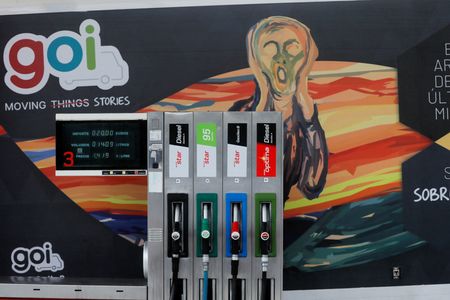 1
1 1
1

By Yuka Obayashi
TOKYO (Reuters) – Oil prices eased on Tuesday, giving up early gains as investors took profits, although expectations that supply will remain tight amid a limited output increase by major producers and a solid post-pandemic recovery in fuel demand checked losses.
Brent crude for April delivery was down 10 cents, or 0.1%, at $89.16 a barrel at 0748 GMT, off an intraday high of $89.70. The front-month contract for March delivery expired on Monday at $91.21 a barrel, up 1.3%.
U.S. West Texas Intermediate crude slipped 6 cents, or 0.1%, to $88.09 a barrel, after gaining 1.5% on Monday. It hit a high of $88.57 earlier in the session.
The benchmarks hit their highest levels since October 2014 on Friday, at $91.70 and $88.84, respectively. They have gained about 17% in January, the biggest monthly gain since February 2021, amid a supply shortage and political uncertainty in Eastern Europe and the Middle East.
“The market is maintaining a bullish tone on expectations that supply tightness will continue as demand is picking up, with receding fears over spreading Omicron coronavirus variant,” said Hiroyuki Kikukawa, general manager of research at Nissan Securities.
“All eyes are on OPEC+ decision as well as development of the conflict between Russia and the West over Ukraine,” he said.
Market analysts and Reuters sources widely expect OPEC+, which groups the Organization of the Petroleum Exporting Countries and allies led by Russia, to keep to its policy of gradual production increases when it meets on Wednesday.
OPEC’s oil output in January has again undershot the rise planned under a deal with allies, a Reuters survey found on Monday, highlighting some producers’ struggle to pump more even as prices are high.
“We expect little surprise from the OPEC+ meeting, though there is a small chance that Saudi will voluntarily increase output outside the OPEC framework to avoid the fall in demand caused by higher prices,” said Naohiro Niimura, a partner at Market Risk Advisory, a research and consulting firm.
“If no surprise, Brent is expected to stay between $85 and $95 for a while due to concerns over supply shortage amid rising geopolitical tensions,” he said.
Tensions between Russia and the West have underpinned crude prices. Russia, the world’s second-largest oil producer, and the West have been at loggerheads over Ukraine, fanning fears that energy supplies to Europe could be disrupted.
The United States and Britain are prepared to punish Russian elites close to President Vladimir Putin with asset freezes and travel bans if Russia enters Ukraine, Washington and London said on Monday as tensions also spilled over at the United Nations.
The risk of geopolitical disruptions to oil supply at a time of already tight inventories due to the strong post-pandemic recovery has sent the premium commanded by barrels for prompt delivery soaring, suggesting the current price rally has further to run.
(Reporting by Yuka Obayashi; Additional reporting by Gavin Maguire; Editing by Lincoln Feast, Stephen Coates and Himani Sarkar)